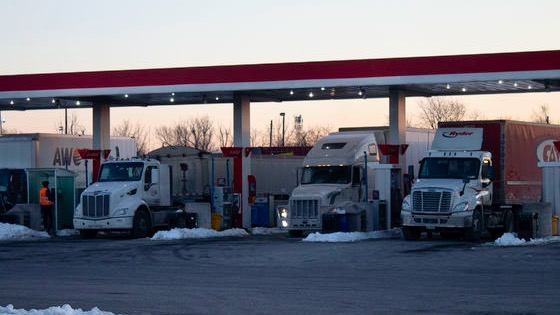In his 25 years of truck driving, Stephen Carbajal has never seen such confusion within the industry. The recent vaccine mandates for Canadian truckers have made him uncomfortable when thinking about the future.
“If things don’t change, boy, the next six to eight weeks are going to get really interesting,” Carbajal said.
The federal Liberal government mandated on Jan. 13 that all truck drivers crossing the U.S. border be fully vaccinated. The decision was made in November, but the Canadian Trucking Alliance pleaded to delay the mandates until 2023 or to keep the industry exempt.
“Most of the time I am in my truck,” Carbajal said. “The only time I get out is to stop to use the bathroom or for food. I have little interaction with others”.
For the past 15 years, Carbajal has worked for the transportation department within the film and television industry for the International Alliance of Theatrical Stage Employees (IATSE). He moves everything on set, from wigs to makeup trailers.
Canadian Minister of Health Jean-Yves Duclos said during an interview for The West Block on Global News that requiring drivers to cross the border into Canada “is the right thing to do.
“Not only to protect themselves, obviously, but also to protect their businesses and the industry,” he said.
However, a Canada Border Services Agency official announced that non-vaccinated Canadian truckers would be turned away. The federal government clarified its position stating that as of Jan. 15, “unvaccinated Canadian truck drivers entering Canada will need to meet requirements for pre-entry, arrival and Day 8 testing, as well as quarantine requirements.”
The directive stated “unvaccinated or partially vaccinated foreign national truck drivers coming to Canada from the U.S. by land will be directed back to the United States.”
The U.S. Department of Homeland Security matched Canada’s requirements, demanding that as of Jan. 22, non-Americans crossing its borders with Mexico and Canada be fully vaccinated.
Marco Beghetto, vice president for communications with the Ontario Trucking Association and Canadian Trucking Alliance, said it’s important to note the vast majority of drivers in that the industry are vaccinated.
He said the past few days have been spent preparing their members with an education campaign and making sure that everybody understands the rules.
“The issue is, you know, even with a 10 to 15 per cent unvaccinated rate, that translates to what, 10,000 to 15,000 truck drivers, which is what is immensely impactful to the supply chain,” Beghetto said.
Canadians have noticed their local stores have been low or out of stock on products since last year. With the rising cost of living, many are worried that this mandate could make the situation worse.
“Well, I think every Canadian has gone to the hardware or grocery store over the last six months and seen, you know, large sections of shelving missing product and the little notes that say temporarily out of stock,” Beghetto said.
Richard Sobkowiak, a local truck driver for Pepsi, says even though he doesn’t cross the border he feels that the mandates are unnecessary.
“In my personal opinion, I don’t think it should be forced on anyone. It should be everyone’s choice,” Sobkowiak said.
Sobkowiak said he was more concerned in the event of a strike. He said northern regions will have a harder time because most of their supplies get trucked in from warehouses, most often located within the GTA. He said he doesn’t understand why the mandates are being put in place when most truckers are in their cabins.
“Realistically, nine out of 10 times you sit in your truck by yourself, so it shouldn’t really matter,” Sobkowiak said. “Nine out of 10 times someone else unloads the truck for you anyway. You just sit back, open the door, and the workers unload it for you.”
Carbajal said what people fail to realize is that everything in our house has been transported by truck one way or another, from winter tires, to furniture, to groceries. Society depends on truck drivers, he said.
He said rather than taking the vaccine, many drivers will park their trucks or take other jobs so they don’t have to cross the border.
“If they’re banking on the truckers to just completely vaccinate themselves to get back to work, they’re going to be sadly mistaken,” Carbajal said.

